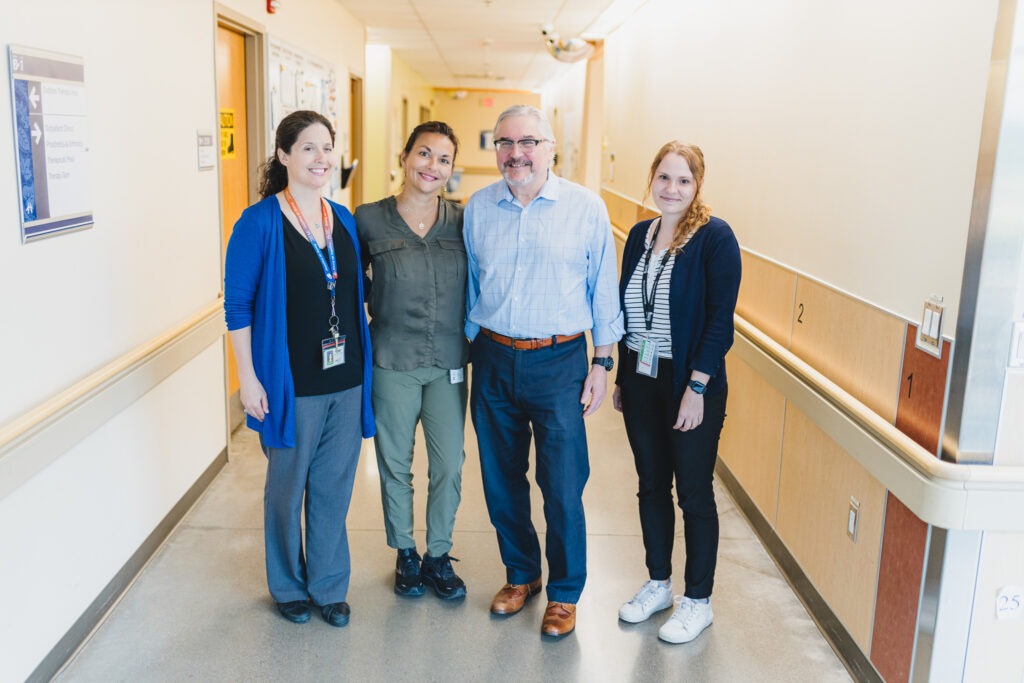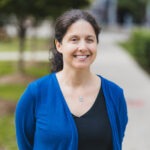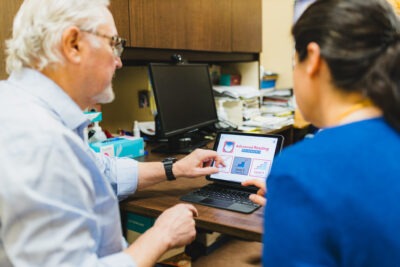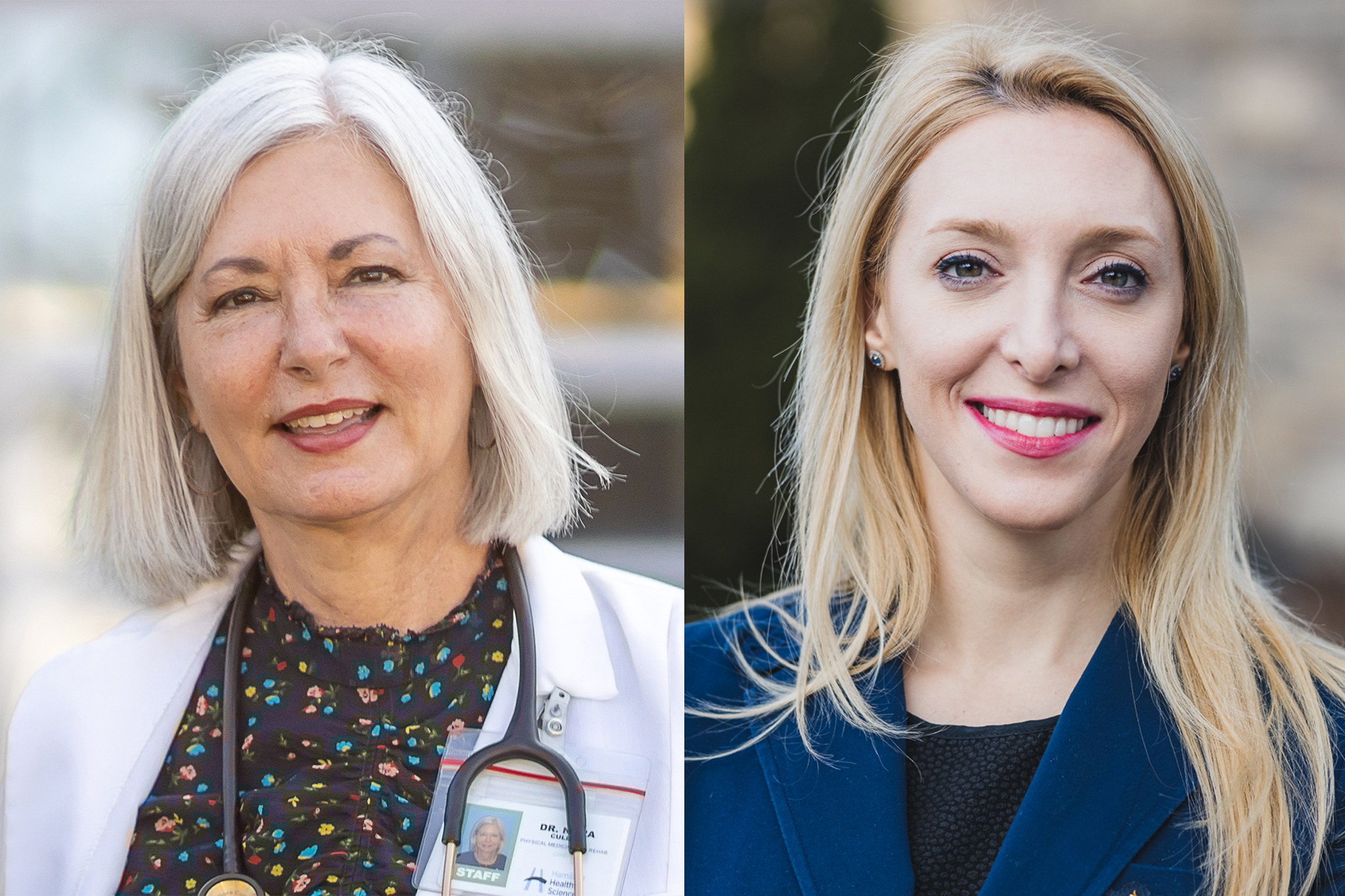
Re-learning to speak after a stroke
In February, Hamilton resident John Kranjc took a skiing vacation in France with friends. On their second last day on the slopes, John had a bad fall. Despite a cracked helmet and initial concerns about breaking the hip he landed on, he walked away with only a concussion and a nasty bruise.
After heading home, the 66-year-old lawyer went back to work and his usual routine. Three days later, during a family breakfast before work, John fell to the ground. He tried to speak, but nothing came out and he couldn’t move the right side of his body properly.
“I knew right away he was having a stroke and I called 9-1-1,” says Michelle Kranjc, John’s wife.
Removing the clot
Thanks to Michelle’s fast action, John was in an ambulance heading to Hamilton Health Sciences’ Hamilton General Hospital (HGH) within minutes and the stroke team was ready for his arrival. HGH is the designated Regional Stroke Centre for the Central South Ontario region.
“My head felt fine when I got home, so I didn’t expect anything like this to happen.”
The stroke team found not only a blood clot blocking the flow of blood to the brain, but also a subacute subdural hematoma – a brain bleed that doesn’t cause symptoms until hours, days or even weeks after a head injury.
“My head felt fine when I got home, so I didn’t expect anything like this to happen,” says John. “It was my hip that was bothering me. It was black and blue all the way to my knee.”
John was quickly sent to have the clot removed, but when he woke up from the procedure he still couldn’t speak, write or hold a pen properly.
“After the procedure, I noticed a huge positive difference in John’s ability to use his right side,” says Michelle. “But it was his speech that was going to take some work to get back.”
Stroke damage causes language challenges
The stroke caused damage to John’s brain that resulted in both aphasia and apraxia of speech that would require rehabilitation to re-learn how to speak, read and write. He was transferred from the stroke unit at HGH to the stroke rehabilitation unit in the neighbouring Hamilton Health Sciences’ Regional Rehabilitation Centre (RRC).
“it requires a significant amount of work to regain the skills that used to be second nature.”
Aphasia is a condition that affects a person’s comprehension and expression of language. Apraxia of speech affects a person’s physical ability to coordinate the speech movements associated with specific sounds.
For example, when John first woke up from surgery, his care team asked him a series of questions, but when he tried to answer, his speech was jumbled, and some of his answers were even in French. This is aphasia. But, if he was asked to say a single word, he wasn’t able to coordinate his mouth to make the correct sounds needed to say that word. This is apraxia of speech.

Shannon Stanners, Speech Language Pathologist.
While on the stroke rehabilitation unit, John worked with a speech language pathologist and communicative disorder assistant multiple times a day. He went from speaking a few single words to saying full sentences.
“John’s progress as an inpatient was impressive,” says Shannon Stanners, speech language pathologist with RRC’s outpatient services. “By the time he was discharged home, the impact of his aphasia on his speech was minimal. It was the apraxia that we still needed to work on.”
Rehab program leads to communication improvements
John was discharged home in March and began working with Stanners and the outpatient speech team in April. While his language comprehension had returned at that point, his speech was still choppy and missing natural rhythm and flow.
“We know how frustrating not being able to communicate properly is for our patients, and it requires a significant amount of work to regain the skills that used to be second nature,” says Stanners. “John’s main goals are to work on his flow of speech, using natural pitch and emphasis, and when stuck on a word to use other words he knows. I remind him often to slow down, take a breath and plan how to place his lips and tongue to say the sound. Slowing down is a key strategy for many of our patients.”

John works to improve his speaking, reading and writing not only at his appointments but also throughout his everyday life.
John has also been working with the outpatient speech team on his reading and writing skills. At discharge he was reading single paragraphs and is now reading short stories and magazine articles. His writing has progressed from single words to short paragraphs.
“Everyone I’ve worked with at the Rehab Centre has been wonderful,” says John. “They take the extra time to personalize the exercises and really set you up for success.”
John is extremely determined and dedicated to his stroke recovery rehabilitation program. He’s been taking every opportunity he can to practice language skills, including cooking meals with Michelle, reading his favourite magazine, The Economist, and having social conversations with family and friends.
A recent success for John was attending a social gathering for a few hours without anyone noticing that he has had difficulties with his speech.
“John’s significant progress is a reflection of his hard work and wonderful support from Michelle,” says Stanners. “Soon he’ll be discharged from outpatient speech therapy, as he’s learned all the skills he needs to continue on his own.”
For now, John plans to work in his garden, cook with Michelle and spend time with his grandkids. And, eventually, he looks forward to returning to work.



